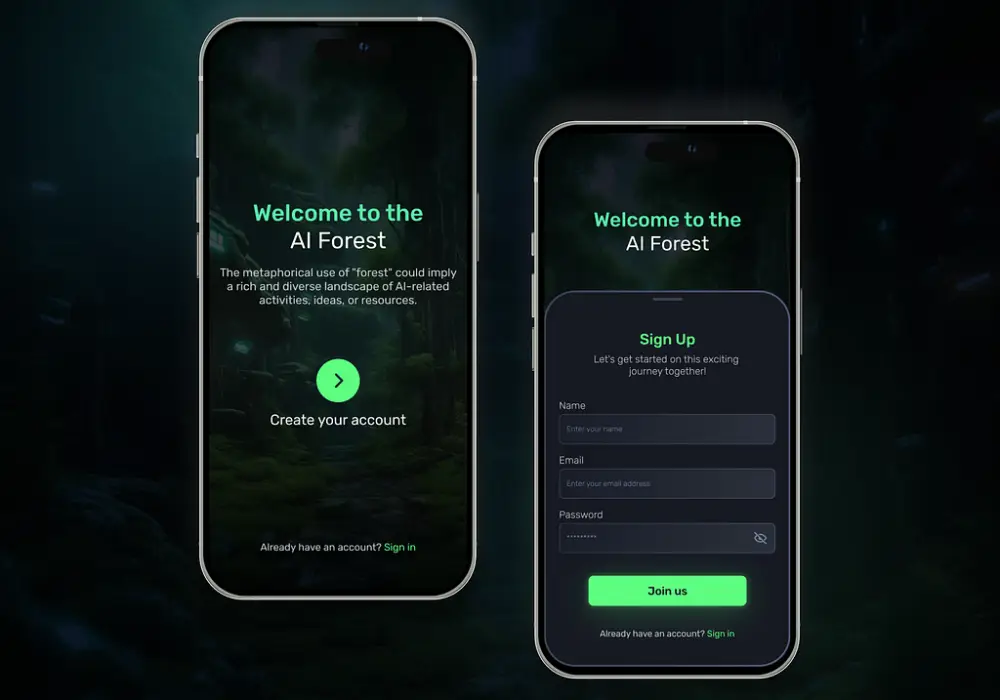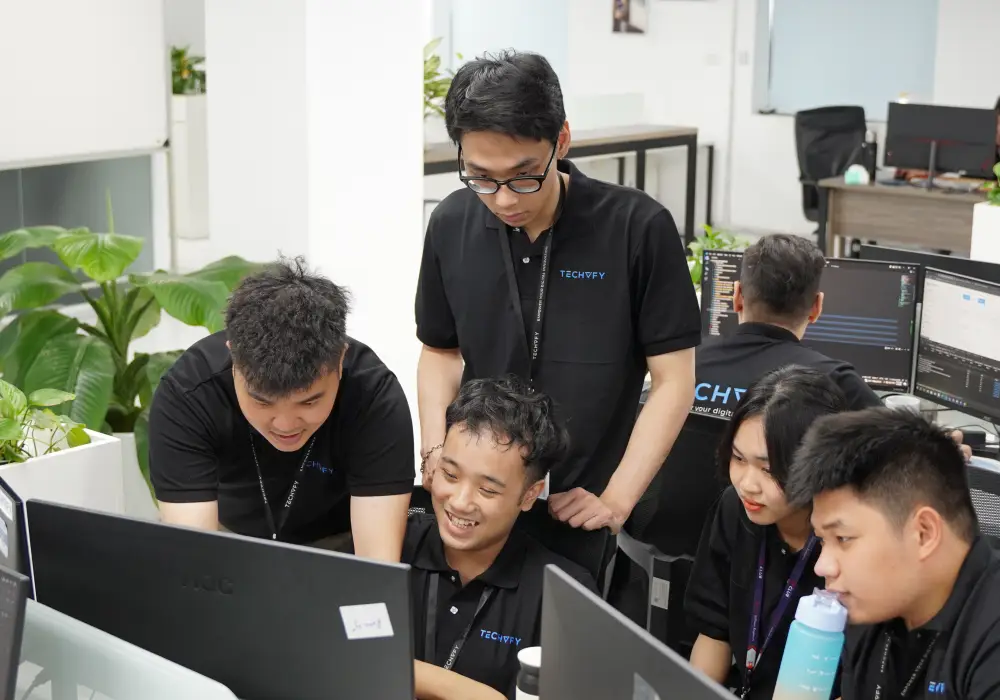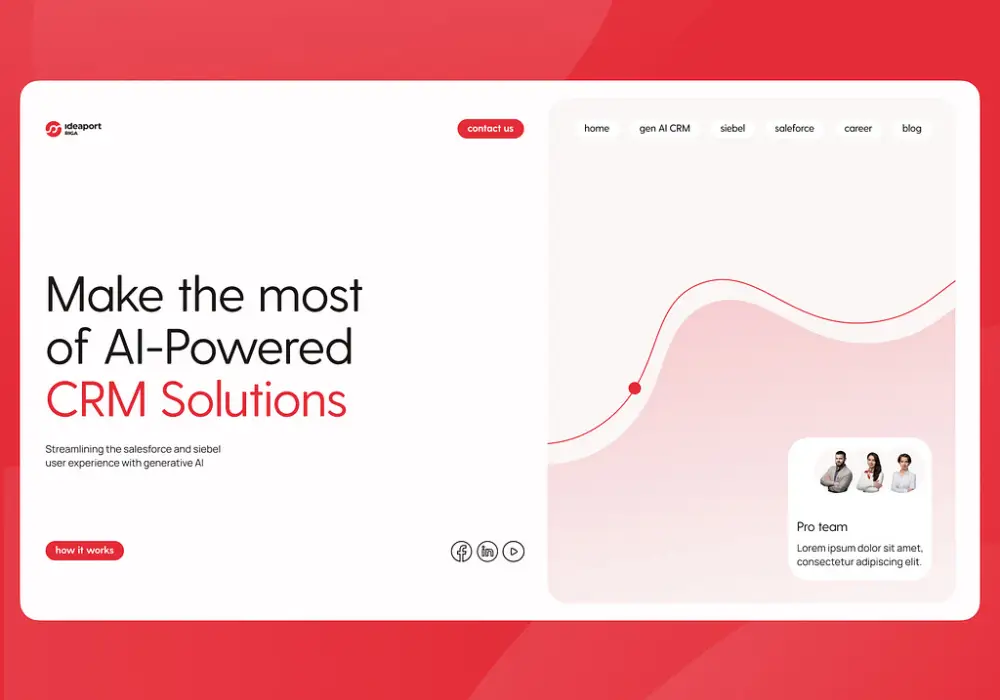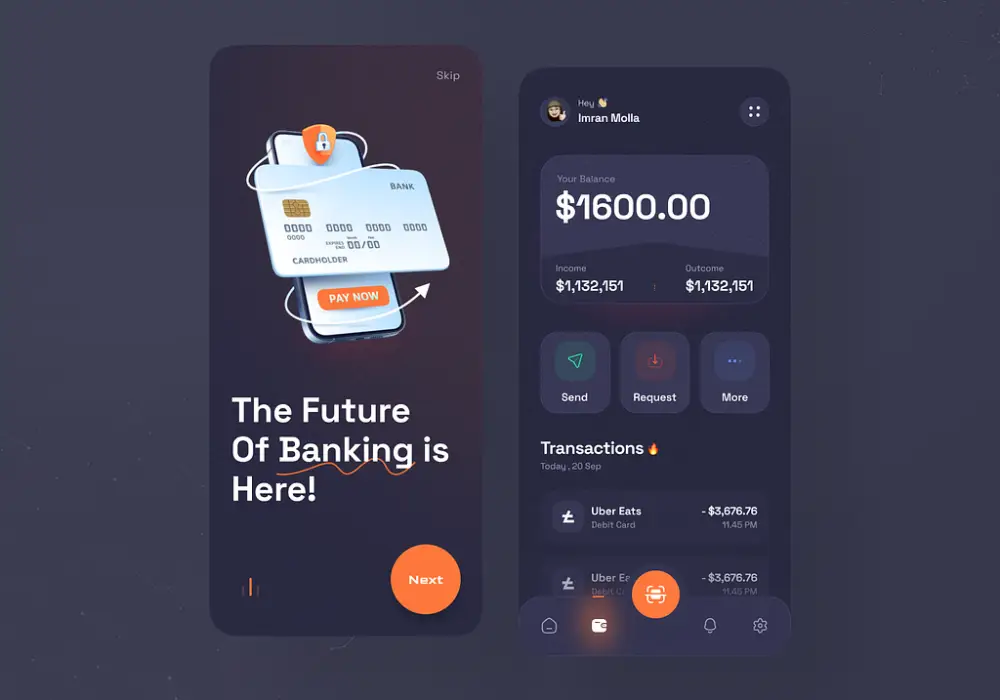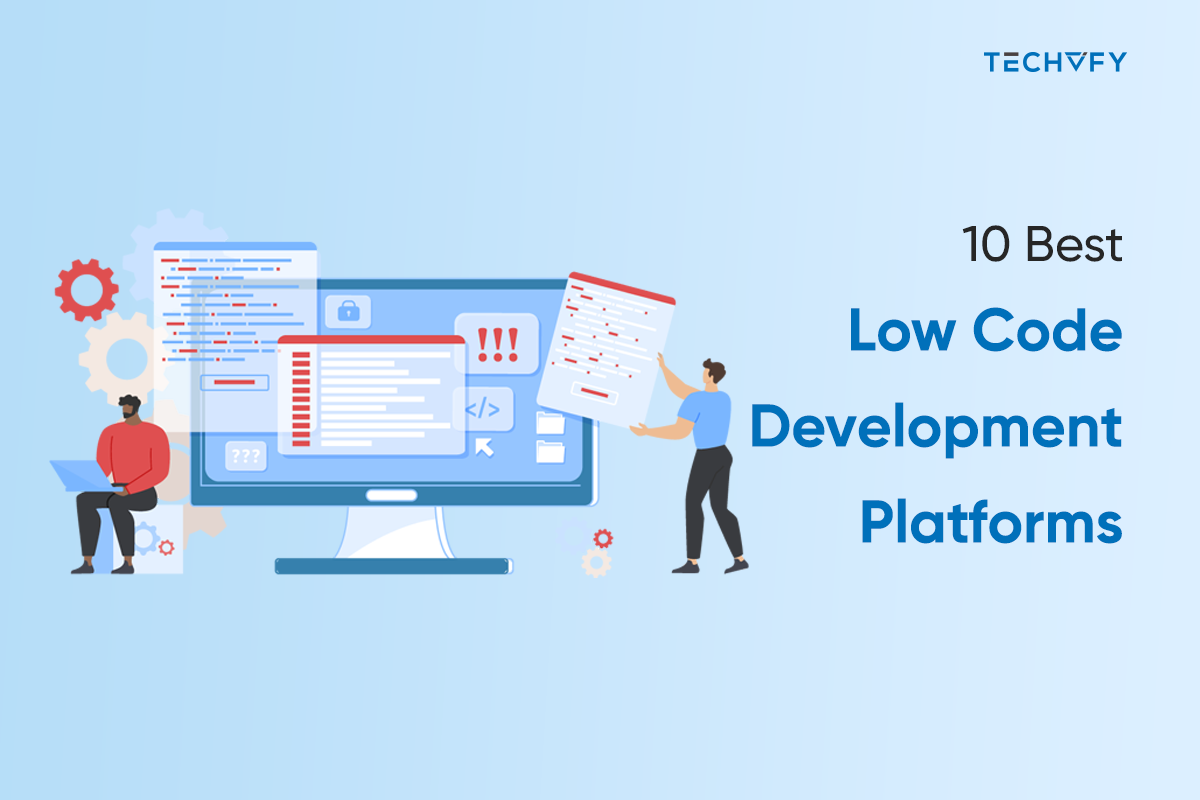Step-by-Step On How To Hire The Best Software Developers For Your Business
- TECHVIFY Team
- 0 Comments
In today’s fiercely competitive business landscape, where technology is not just an enabler but often the core of the business itself, the caliber of software developers a company employs can significantly dictate its success and sustainability. Hiring top-tier software developers is more than a mere staffing decision; it’s a strategic move that provides companies with a critical edge over their competitors and equips them with the agility needed to adapt and thrive in the ever-evolving tech environment.
The right developers bring a blend of technical prowess, innovative thinking, and problem-solving skills that can propel a company forward, helping it to not only meet current industry standards but also set new benchmarks. As the process of identifying and attracting the best talent becomes increasingly complex, it requires a well-thought-out strategy. This strategy should not only focus on the technical skills but also consider how well candidates fit within the company’s culture and long-term objectives.
Let TECHVIFY guide you through a detailed, step-by-step process to hire the best software developers for your business, ensuring that your team is powerful, proficient, and prepared to handle the challenges of tomorrow’s tech landscape.
1. 07 Steps on How to Hire the Best Software Developers
Hiring the right software developers is crucial for the success of your technology projects. Whether you’re building a new app, creating a software product, or maintaining and improving existing systems, the quality and fit of your developers can make a significant difference.
Here are 07 key steps to help you identify, evaluate, and hire the best software talent effectively, ensuring that your team not only possesses the right skills but also aligns with your company’s culture and business objectives. Follow these steps to optimize your hiring process and secure top-tier software development talent.
Step 01: Specify Your Business Needs
Understand the Unique Needs of Your Business
Every organization has unique requirements when it comes to hiring software developers. Reflect on the specific needs that drive your hiring decision. Are you aiming to develop a mobile application, a dynamic website, an MVP (Minimum Viable Product), or perhaps enhance your existing digital tools? Clearly defining the purpose and goals for your new hires is crucial for aligning your tech team with your business strategy.
Evaluate Your Current Team’s Capabilities
Consider the current composition of your team. You might already have developers skilled in certain areas but lacking expertise in others, such as data engineering or machine learning. Identifying these gaps will help you pinpoint the exact type of specialist you need, whether it’s for augmenting the current team or building a new one from scratch.
Decide on Outsourcing vs. In-House Development
Determine whether outsourcing or expanding your in-house team is the best approach based on your project requirements and long-term business goals. Outsourcing can be advantageous for short-term projects or when needing specialized skills that are not central to ongoing operations.
Step 02: Determine The Employment Model
Project-Based Model
For projects with well-defined requirements and timelines, consider the project-based model. This approach is cost-effective and straightforward but lacks flexibility for projects likely to evolve in scope.
Dedicated Team Model
If your project needs continuous development and you prefer close collaboration, opt for a dedicated team model. This setup allows for adaptable planning and in-depth involvement with the development process, ensuring that the team can pivot as requirements change.
Extended Team Model (Staff Augmentation)
If you have an existing team but need additional expertise, staff augmentation can fill those gaps. This model allows you to integrate outsourced specialists seamlessly with your in-house team, providing both expertise and support without the commitment of a full-time hire.
Step 03: Choose A Country To Hire From
| Country | Avg. Hourly Rate | Language Proficiency | Cultural Compatibility | Notable Outsourcing Hubs |
|---|---|---|---|---|
| Vietnam | $20 – $40 | High | Moderate | Hanoi, Ho Chi Minh City |
| India | $15 – $35 | Very High | Moderate | Bangalore, Hyderabad |
| Ukraine | $25 – $50 | Moderate | High | Kyiv, Lviv |
| Poland | $30 – $60 | High | High | Warsaw, Krakow |
| United States | $70 – $150 | Very High | Very High | Silicon Valley, NYC |
When selecting a location from which to hire remote developers, consider factors like cost, language proficiency, and cultural compatibility. Southeast Asia, particularly Vietnam, offers a compelling mix of affordability and technical expertise, making it an ideal region for outsourcing. Companies like TECHVIFY, a leader in Global AI Development & Software Development Outsourcing in Vietnam, are recognized for their exceptional service and have collaborated with major businesses like SP Group and KPMG.
Looking to Outsource Development?
Contact TECHVIFY, Vietnam’s Leading Offshore Software Development & Outsourcing Company, for a consultation and development services.
Step 04: Find Necessary Specialists
Utilize Talent Marketplaces
Platforms such as Upwork, Freelancer, and Guru are excellent for finding freelance developers with diverse skill sets. These sites allow you to evaluate candidates based on their portfolio, client reviews, and rates.
Explore Dedicated Team Providers
For a more structured engagement, websites like Clutch and GoodFirms help you discover and vet IT development agencies. These platforms provide insights through client reviews and rankings, helping you find reputable partners for long-term collaboration.
Step 05: Verify The Expertise
Review Credentials and Portfolios
Examine the past projects and credentials of potential hires or agencies to ensure they meet your technical requirements. Platforms like Dribbble and Behance can also offer a glimpse into the creative and technical prowess of developers and designers.
Assess Soft Skills
Soft skills such as communication, teamwork, and problem-solving are equally important. These skills ensure that developers can integrate well with your team and contribute to a collaborative working environment.
Step 06: Conduct Interviews
Interviews are essential for assessing both the technical and soft skills of candidates. Discuss their previous projects in detail and pose hypothetical scenarios to evaluate their problem-solving skills and creativity under pressure.
Step 07: Start The Job
Once you have selected the best candidates, formalize the engagement with a clear contract that outlines the scope of work, deadlines, and payment terms. Ensure mutual understanding and agreement on all terms before commencing work to set a solid foundation for a successful collaboration.
2. Why Would You Hire Top Developers?
Hiring top software developers can significantly enhance your business’s productivity and competitive edge. Here are some key reasons, outlined in bullet points with highlighted bullets, why you should consider hiring top talent:
- Market Growth and Demand: The IT outsourcing market is expected to grow to $171.5 billion by 2028, with a compound annual growth rate of 5.1%. The demand for software developers is projected to grow by 21% by 2028, much faster than the average for all other jobs.
- Skill Shortages: There are not enough qualified people to fill software development positions, especially when relying solely on local talent pools. 83% of small businesses plan to maintain or increase their spending on outsourced business services, indicating a shift towards global talent sourcing.
- Sustainability of Business Operations: Leveraging top developers helps ensure that your technology infrastructure can adapt and evolve, supporting long-term business sustainability.
2.1. Tech Stack Knowledge
Top developers have a deep understanding of various technology stacks, which is essential for selecting the appropriate technologies for your projects. Their proficiency ensures that your software solutions are built using the most effective and efficient tools available.
- Selection of Optimal Technologies: They can choose the best tools and frameworks that match the specific needs of your project.
- Future-proof Development: Skilled developers ensure that your technology stack is scalable and capable of integrating future advancements.
2.2. Fast Growth
High-quality developers accelerate development timelines which can greatly reduce time to market. This rapid deployment capability enables quicker responses to market changes and customer needs.
- Speed to Market: Faster development cycles allow your products to reach the market quicker than competitors.
- Scalability: Top developers can efficiently scale your solutions to handle increased loads, aiding in rapid business expansion.
2.3. Budget Adherence
Experienced developers have a track record of efficiently managing resources to ensure projects stay within budget. Their ability to foresee and mitigate financial overrun is crucial for maintaining financial health.
- Accurate Estimates: They provide realistic and precise budget forecasts, avoiding unexpected expenditures.
- Cost Efficiency: Top developers optimize resource use, which can lead to significant cost savings over the project lifecycle.
2.4. Strong Team Required
Top developers not only contribute their skills but also enhance the overall team dynamic. They serve as mentors and role models, fostering a productive and innovative team environment.
- Mentorship: Their experience and knowledge are invaluable for training and upskilling junior team members.
- Team Cohesion: They help in building a collaborative team culture, essential for successful project outcomes.
2.5. Innovation and Competitiveness
Innovative developers push boundaries by integrating the latest technologies and thinking creatively about solutions. This drive for innovation keeps your business at the forefront of your industry.
- Implementation of Latest Technologies: They help incorporate state-of-the-art technology into your projects.
- Creative Problem Solving: Their innovative approach to challenges can lead to unique features and functionalities that set your products apart.
2.6. Quality Assurance
Experienced developers prioritize quality at every stage of the software development process, from initial design to final testing. This focus on quality ensures that the end product is robust and reliable.
- High Standards of Code: They produce clean, maintainable, and efficient code.
- Thorough Testing Processes: Rigorous testing routines are integral, ensuring the software is free from critical bugs before release.
2.7. Global Reach
Engaging top developers often means you’re not limited to local talent, which expands your business’s capabilities and reach. This global perspective can bring fresh insights and opportunities.
- Access to Diverse Skill Sets: They bring a variety of experiences and skills from different parts of the world.
- Market Expansion: Their global insights can facilitate your entry into new markets, enhancing your business’s growth potential.
2.8. Risk Management
Top developers bring a level of expertise that significantly mitigates project risks. They are adept at foreseeing potential challenges and implementing strategies to avoid them, ensuring smoother project execution.
- Proactive Problem Solving: Top developers anticipate and address issues before they become critical, reducing downtime and avoiding costly delays.
- Adherence to Best Practices: They uphold industry standards and best practices in software development, which minimizes security vulnerabilities and ensures high-quality outputs.
3. What to Avoid When Hiring a Developer
Hiring the right developer can significantly impact the success of your projects and the overall dynamics of your team. However, common pitfalls during the hiring process can lead to poor outcomes, diminishing the potential benefits of new hires. To optimize the integration and productivity of new developers, here are several critical mistakes to avoid:
3.1. Poor Onboarding Practices
A smooth onboarding process is crucial for new developers to feel welcomed and to ramp up quickly. Neglecting this can lead to confusion and decreased motivation.
- Lack of Introduction to Project Details: Failing to provide a comprehensive overview of the project’s goals, current progress, and existing challenges can leave new hires feeling lost.
- Inadequate Documentation and Support: Always ensure that new developers have access to all necessary project documentation and are introduced to the company’s workflows, culture, and their specific responsibilities.
3.2. Unclear Expectations
Setting clear expectations from the outset prevents misunderstandings and ensures that everyone is aligned with their roles and objectives.
- Explicit Communication of Job Roles: Clearly communicate what is expected from the new developer, including specific tasks and objectives.
- Alignment with Team Expectations: Engage with your current team to understand their expectations and how the new developer can best contribute to the team’s goals.
3.3. Misleading Job Descriptions
Honesty in the job description is paramount to attract the right talent and to maintain credibility and morale within the team.
- Accurate Representation of Role: Ensure that the job description accurately reflects the actual responsibilities and requirements of the role.
- Transparency During Recruitment: Be upfront with candidates if their profile slightly deviates from your ideal; discuss the potential for growth and learning within the role.
3.4. Overemphasis on Compensation
While compensation is important, it should not be the sole focus during the hiring process. Consider the broader value that a developer brings and the cultural fit within the team.
- Balanced Evaluation: Assess candidates based on a combination of skill, potential cultural fit, and motivation, rather than salary expectations alone.
- Comprehensive Offer: Ensure that your offer includes opportunities for professional growth, a supportive work environment, and a sense of purpose, in addition to a fair salary.
Avoiding these common mistakes can greatly enhance the effectiveness of your hiring process and ensure that new developers are positioned to succeed and contribute positively to your organization from day one.
Let’s talk
A consultation with the Client Relationship Manager, who represents TECHVIFY, without any commitment from your side, will give you:
- Structured and clear vision of your future application
- Information about how our software development company guarantees 100% on-time and on-budget delivery
- Recommendations for choosing the tech stack
- Advice on further steps
- Business-side recommendations
- Rough project estimation on software development
TECHVIFY is right where you need. Contact us now for further consultation:
4. Define What Type of Developer You Want to Hire
Understanding the diverse skill sets and areas of expertise in software development is essential to hiring the right developer for your project. Each type of developer brings unique capabilities to a team, and knowing the differences can help you make an informed decision that aligns with your project goals and needs.
4.1. Frontend Development
Frontend developers focus on the user interface and experience of a software application. They create the visual elements that users interact with within a web browser or app. Key technologies include:
- Languages: JavaScript, HTML, CSS
- Frameworks: React, Angular, Vue.js
4.2. Backend Development
Backend developers work on the server side, dealing with databases, application logic, and server integration. Their work is crucial for processing and managing data exchanged between the server and the users. Common languages and technologies include:
- Languages: Python, Java, C#, ASP.NET
- Frameworks and Tools: Node.js, Django, .NET Framework
4.3. Full-stack Development
Full-stack developers have the combined skills of both frontend and backend development. They are versatile developers who can manage and oversee projects across all technical fronts.
- Key Skills: Proficiency in both frontend and backend languages and frameworks
4.4. Web Development
Web developers specialize in building websites and web applications. They might focus on either frontend or backend or work across both areas depending on their role.
- Common Languages: JavaScript, PHP, Ruby
4.5. Mobile Development
Mobile developers focus on creating software for mobile devices. They need to have specific knowledge related to mobile platforms such as Android and iOS.
- Platforms: Android (Java, Kotlin), iOS (Swift, Objective-C)
4.6. UX/UI Designers
While not always classified as developers, UX/UI designers play a crucial role in the development process by designing the visual and interactive aspects of an application, ensuring it is engaging and user-friendly.
- Tools: Sketch, Adobe XD, Figma
4.7. Data Science Developers
These developers specialize in algorithms, data analytics, and statistical programming to extract insights and intelligence from data.
- Languages: Python, R, SQL
4.8. DevOps Engineering
DevOps engineers bridge the gap between development and operations teams. They enhance the collaboration and productivity by automating workflows and integrating various aspects of development, testing, and deployment.
- Tools: Docker, Kubernetes, Jenkins
4.9. QA and Testing
Quality Assurance and testing engineers ensure that the software meets all specifications and requirements before it goes live. They identify bugs and issues that could impair the functionality of the software.
- Focus: Test automation, manual testing, performance testing
4.10. Support Engineering
Support engineers maintain the health of software applications post-deployment. They handle ongoing support, troubleshoot issues, and ensure optimal performance of the software.
- Skills: Problem-solving, system monitoring tools, customer support
TECHVIFY – Global AI & Software Solutions Company
For MVPs and Market Leaders: TECHVIFY prioritizes results, not just deliverables. Reduce time to market & see ROI early with high-performing Teams & Software Solutions.
- Email: [email protected]
- Phone: (+84)24.77762.666




